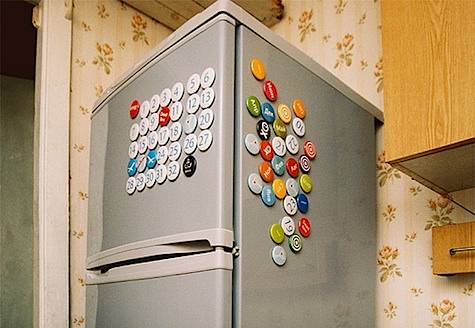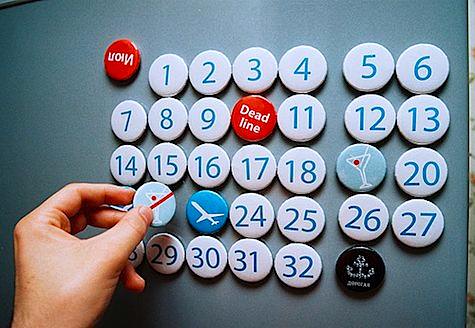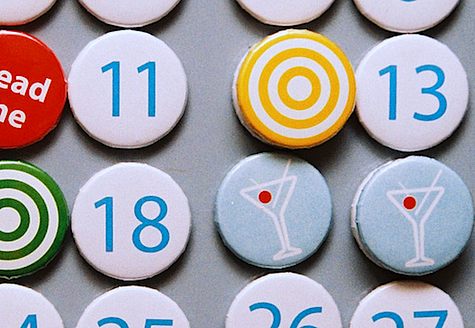We might be fast approaching the time when everyone starts setting New Year’s Resolutions, but it’s obvious that you can start a money management calendar at any time of the year. Even today would be the best day to get started, so let’s look at some ways you can create a calendar to use no matter what time of the year you get going with it!
I am actually facing the start of the year with an overwhelming schedule. There is lots to be done on all fronts: I joke that I am working on “re-nesting” activities, which means that I am redecorating and reorganizing our house to fix up old furniture and organize certain rooms like our office. Our house needs an upheaval! But in terms of personal finance, there’s also quite a lot to be done. So let’s see how we can clear the cobwebs for this effort. This Schwab calendar may inspire you to do your own schedule.
 Image from Behance.net
Image from Behance.net
How To Set Up A Personal Financial Calendar & Get Organized
Let’s suppose we’re starting fresh: how are you setting up your financial plans for the coming year?
Step One: Become familiar with your current financial position.
This could be something you do during the first month. If you have never thought about creating a financial calendar before, you have to start somewhere. For instance, on the first month, I would work on understanding my goals and find out which are the most important matters I’d like to get done. In my case, I’d like to make sure that I set up an improved accounting system for my business and personal matters. Maybe a tool like PocketSmith can help. Check out our review of this online budget planner: they’ve got a calendar built into their tool.
Step Two: Know which areas are lacking in attention.
Make a list of the things you need to get set up or that you need to pay more attention to. By committing something in writing, you may find the conviction needed to move towards completing your goals. I like the top down approach — I start out with the big picture and list everything down. Later on, I follow up with checking each detail in some depth. For instance, if you haven’t set up an emergency fund yet, find out if it’s something you can manage. If you haven’t signed up for a 401k plan, then do so — it’s free money! Write down all the targets you need to achieve and when you would like to achieve them (or a deadline date if it is something more rigid).
Step Three: Prioritize your goals. Focus on your high priority items.
Because it’s costing you to carry debt, your highest priority should be to lessen or eliminate your debt load. This is something that may need to be factored into every month of your calendar and your budget. For example if you have a debt of $5,000 you may be able to pay off a couple hundred dollars each month over the next two years to get rid of it. It would be a good idea to set up a year’s worth of goals and set dates to them to make things as concrete as possible.
 Image from Behance.net
Image from Behance.net
Step Four: Don’t forget important payments that have specific deadlines.
The following is a sample of a calendar, which I set up for just the first half of the year. You’ll want to do this for the entire year if you can. It will help you identify what needs to be done in the year, along with their corresponding dates to complete:
January
- Review your Christmas debt and other debt. Create a plan to tackle them.
- Determine your personal annual budget. If you run a business like I do, then work out your budget and financial plans for this as well. Set up our accounting systems to get ready for the year.
- Evaluate your investment portfolio and review its performance. See if you need to rebalance it and plan accordingly.
- Watch out for tax-related documentation that could come in the mail.
February
- Prepare for taxes.
- Make contributions to your IRA, 529 savings plan, etc.
March
- Make your tax appointment with your CPA or tax guy.
- Get your credit report from AnnualCreditReport.com and pick up some free credit scores.
April
- File and pay your taxes.
- If you get a refund, think about investing the windfall or using it to pay down any debt you still have.
May
- Create a financial and emergency disaster plan.
- Check up on your insurance claims, if you have anything outstanding.
- Know when you need to pay for your insurance policies, such as life, auto, health, etc.
June
- Perform a mid year evaluation of your finances to ensure that you are on track for the year. Make adjustments if needed.
- Review your estate plan.
- How is your cash flow at this time?
Again, this is just an example of what you can do when you develop a financial calendar. If you have financial payments that are due in specific months of the year, then something like this can help. For instance, car insurance and other similar payments may only occur annually; jot them down on the appropriate month and ensure you have the funds in place for those.
 Image from Behance.net
Image from Behance.net
Step Five: Think ahead, to the future!
The whole idea behind planning a calendar for the year ahead is to ensure that nothing catches you off guard. Simple planning and looking ahead can get you into a good financial position. For instance, saving up for your taxes every month will allow you to have the right amount of money ready to pay when the time comes. Putting off the savings that you need to make will mean scrambling, scrounging around and worrying about a bigger amount of money you need to come up with, when your bill finally falls due.
If you find that doing a month-to-month financial calendar is just way too much overhead, then start simply. Jot down your income and the different bills and obligations you need to pay each month. If you’d rather work on a different system to make sure you get things done, then go ahead with that! A calendar is merely a tool to help you become more organized about how to approach your life and finances.
What kind of organizational system do you adhere to?
Copyright © 2010 The Digerati Life. All Rights Reserved.

{ 11 comments… read them below or add one }
Calendars are good ways to get you organized. The preparation to place things on the calendar is actually more important! It makes you realize what you have to do. I use a day timer style calendar as a way to remind me of tasks. I also use online banking to schedule my payments and set up automatic payments.
I also like to break up larger goals into smaller ones as well. Things like saving XX dollars in a year is broken into saving XX each month. It seems less overwhelming that way.
I really like the idea of setting up a financial calendar for the year with monthly priorities. People really need goals. However, sometimes the piece of paper does not get very well integrated into people’s routines. It might help to use online software that reminds you (for example, sends alerts) and I use Mint.com, which now has a goal setting feature, however there are many other budgeting tools, some which are also provided for free by your broker or bank. Or, if you use MSFT Outlook, I would suggest taking these monthly goals and putting them in your calendar and set aside time to get them done!
I use Outlook quite a bit with alerts and it helps…. except when your computer crashes, so an old school manual daytimer is needed for a backup. Your item #3 mentions paying off debt. I do real estate loans for a living and many times it means being a counselor to advise people they need to payoff debt to qualify for a mortgage. It amazes me that more people don’t understand this. Based on a 5% 30 yr interest rate, a consumer loses $19,000 in purchasing power toward a home purchase, per every $100.00 they pay in minimum monthly payment consumer debt. So indeed paying off debt should be a priority when renewing your yearly plan.
I really like the idea. In fact, I started using Google Calendar to do that. I use it for personal finances but also for investment such as earnings and ex-dividend dates. I use Google Calendar because I am visiting family, I have access to it. It’s quite easy to share with friends too.
I really like this concept. I’m into organization and planning, so this approach of setting up a timeline/calendar is really interesting. Personally, I have had specific dates earmarked for certain financial activities (example: visit tax accountant, pay bills, etc). This approach is great. Thanks for sharing.
Thanks for all your comments!
A lot of people use calendars for goal setting. I use it mainly as a reminder for what I need to have done for the year. As an extension of this idea, I also put my household’s big projects on the calendar. In the past, I’ve created a gargantuan “project” schedule for my household for the year. In it, I had my home projects, children/school related projects mixed with big spending, saving and other financial goals. For instance, sometime in the summer, I have to make sure my life insurance premiums are paid. In February, it’s taxes. In October, it’s Christmas budgeting and making sure our Christmas lights are still working and don’t need to be replaced. Etc.
When I see that calendar, it just makes the year seem to go by even faster than it already does!
I set up my calendar to do things on paydays. When I get the money, I want to plan how much I’ll be able to spend and how much is set aside for bills and goals.
I think I need this a lot. I will definitely do this in 2011. I was in an unstable financial status this year. I had challenges controlling my expenses and ends up with no savings at all.
After finishing your article, I opened my diary and low behold I’m already doing this. I write down my pay-days (and my estimated pay) and when my major bills (e.g. car insurance) are due. I also put a reminder a few days before to transfer the money out of my account. The transfer takes up to three business days. I’m constantly reading my diary! I also keep a copy of my budget written out in the back pages along with a list of my resolutions and other goals.
After all, we mark in people’s birthdays, why not our finances?
Wow! I love your idea. I have always been in trouble with my debts, managing my finances (with a little income), and cost-cutting my unnecessary personal expenses. I have been trying to list down the necessary things that I need to spend weekly or perhaps monthly, but was not able to do. Now with your ideas, I would definitely make a calendar for my finances and hope to settle all my debts with my credit cards soon.